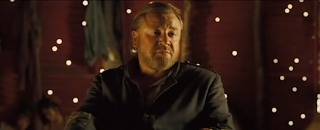5. Guy Pearce in The Proposition- Pearce gives a strong understated performance that is particularly effective in portraying the complex relationship that motivates his character.
4. Robert Downey Jr. in Kiss Kiss Bang Bang- Downey could not be better in his role finding just the perfect tone for the film.
3. Tommy Lee Jones in The Three Burials of Melquiades Estrada- Jones perfectly cast himself portraying the complex motivations of his character brilliantly.
2. Viggo Mortensen in A History of Violence- Mortensen is terrific in his depiction of the slow dissolution of his character.
1. Ray Winstone in The Proposition- The underrated Ray Winstone wins this year with his powerful performance as a man trying to bring the law to the lawless. Winstone succeeds far more than anyone would expect creating a poignant depiction of a character that could perhaps have been a throwaway in lesser hands.
4. Robert Downey Jr. in Kiss Kiss Bang Bang- Downey could not be better in his role finding just the perfect tone for the film.
3. Tommy Lee Jones in The Three Burials of Melquiades Estrada- Jones perfectly cast himself portraying the complex motivations of his character brilliantly.
2. Viggo Mortensen in A History of Violence- Mortensen is terrific in his depiction of the slow dissolution of his character.
1. Ray Winstone in The Proposition- The underrated Ray Winstone wins this year with his powerful performance as a man trying to bring the law to the lawless. Winstone succeeds far more than anyone would expect creating a poignant depiction of a character that could perhaps have been a throwaway in lesser hands.
- Ray Winstone in The Proposition
- Viggo Mortensen in A History of Violence
- Philip Seymour Hoffman in Capote
- Tommy Lee Jones in The Three Burials of Melquiades Estrada
- Heath Ledger in Brokeback Mountain
- Robert Downey Jr. in Kiss Kiss Bang Bang
- Guy Pearce in The Proposition
- Russell Crowe in Cinderella Man
- Ralph Fiennes in The Constant Gardener
- Pierce Brosnan in The Matador
- Jake Gyllenhaal in Brokeback Mountain
- Eric Bana in Munich
- David Strathairn in Good Night and Good Luck
- Christian Bale in Batman Begins
- Joaquin Phoenix in Walk the Line
- Greg Kinnear in The Matador
- Jesse Eisenberg in The Squid and the Whale
- Tom Cruise in The War of the Worlds
- William Moseley in The Lion the Witch and the Wardrobe
- Adrien Brody in King Kong
- Matt Damon in Syriana
- Daniel Radcliffe in The Goblet of Fire
- Terrence Howard in Hustle and Flow
- Johnny Depp in Willy Wonka and the Chocolate Factory
- Hayden Christensen in Revenge of the Sith




























